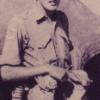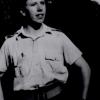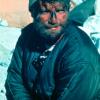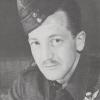‘From the many cards and letters I received from friends, family, workmates and comrades after his death, it’s clear that people saw him as a warm, fun-loving and gentle-man. Usually wearing a broad smile to match his own brand of scouse humour!!! He was greatly respected for his practical plain-speaking, straight forward approach to life.’
Harry “Darkie“ Houghton.
Harry was born in Liverpool in August 1918. As a child his keen sense of humour and undoubted sporting abilities and achievements helped to make him a popular lad at school. He particularly enjoyed camping, cycling, football, cricket, boxing and swimming and had a keen interest in keeping fit.
It was therefore no doubt a natural progression to become a P.T.I. in the Army and to join the Paras when they were formed in Egypt. Post-war, Harry attended and passed a training course in Physiotherapy. In his 90s he joined what he called a “physical jerks” group (keeping fit for older people!) and although he used a mobility scooter and wheelchair to get about in later years, he could be spotted every day he was at home, waving from the window to his neighbours and friends, while cycling on his exercise bike.
With a gift for precision, an eye for detail and an admirable sense of commitment, Harry had been apprenticed as a fibrous plasterer at the age of 14. He was to remain with the company until his retirement on his 65th birthday. However his working career was inevitably interrupted due to wartime service.
While working in Newcastle he enlisted and was sent to Scotland for his basic training in the Highland Light Infantry. Later he was transferred to the Glasgow Highlanders and became a Lance Corporal. He became a full Sergeant, moved back to England and worked on ground defence of aerodromes.
When drafted overseas Harry was Company Sergeant Major and put in charge of a company of drafted soldiers bound for Egypt. It was there he joined the Parachute Regiment and accepted an initial “demotion” in rank. He had rudimentary Para training in the desert and became part of “S” Battalion before the formation of 10th Battalion. Training continued in the Middle East, Palestine and North Africa and Harry became involved in the invasion of Italy.He became Provo Sergeant and eventually returned to England to prepare for the invasion of Europe. Harry was stationed in Somerby, the Leicestershire village, which was to play a significant part in his later life, as he would re-visit the area to join the annual 10th Battalion Reunions, and to attend the annual Church Parade and meet and build up a friendship with Captain Sean Phillips, who was many years later to be instrumental in Harry’s final return to Arnhem and his “tandem jump”. In September 2011 a plaque was dedicated to Harry at All Saints church, Somerby and he is now displayed on the Roll on Honour in the village hall.
As Stick Commander, “Darkie” dropped onto Ginkel Heath on 18th September 1944 during Operation Market Garden. Along with his Commanding Officer, who later died of his wounds, Harry was seriously wounded, (6 wounds to each leg, five to the right arm and one in the stomach), at the cross-roads in Oosterbeek. The leather wallet which he was carrying in his breast pocket, a 21st birthday present from his Sister, had no doubt saved his life, as it, and the enclosed family photographs ,took the impact. Harry and his C.O. had gone to help two gunners who were trying to hook up a six-pounder onto a jeep. Harry was awarded a M.i.D.
Harry was moved several times to “safe-houses” as the enemy where taking over the centres being used for dressing stations. Eventually because he had to refuse offers to take him toward the Rhine because he would be a burden to the able-bodied, he was taken prisoner. After a short time in a German military hospital in Dusseldorf, he was taken to Stalag 8C close to the borders of Germany and Poland. Life was hard but release came when the Russians advanced. Harry trekked through Poland to meet the Russians who provided cattle trucks to get the soldiers home.
The sea journey from Odessa to home was long and difficult as Harry spent the trip in the hospital with a relapse of malaria. When the ship docked, Harry returned to Liverpool, via Glasgow, was given several months leave and was finally discharged for “ceasing to fulfil Army physical requirements”. As a man keen on fitness this was a hard line to accept.
However Harry returned to civilian life, his old job, friends and family and married his sweetheart in 1947 and was to become a father in 1949. He worked long hours and dedicated himself to the family. The war had however changed his life and recurrent nightmares around mid-September were to return every year for the rest of his life. Harry coped and was, as the years progressed, comfortable to talk more freely about his wartime experiences and regularly met with other veterans .He also attended local Schools to talk with groups of pupils and to address larger groups during school assemblies.
Harry dealt stoically with periods of ill-health in his later years, and with increasing mobility problems. Time spent in hospital could lead to a couple of weeks of convalescence. He enjoyed that. It was like a holiday! He maintained strong links with the Parachute regiment, was a member of the Leicester and the Merseyside branches and was a regular visitor to the Redditch Branch, in the Midlands, when he visited his daughter and son-in-law. He was also a life member of the Alvechurch Branch of the Ex-Services Association, also based in the Midlands.
There is no doubt that Harry was young in outlook, naturally optimistic and extremely lively in spirit. Holidays, day trips and social activities were a regular feature of Harry’s life. He loved all military events and commemorations. He made regular visits to Arnhem. He was humbled and honoured to lay a wreath for Merseyside Arnhem Veterans in Oosterbeek cemetery in 2010, alongside Gerry Dimmock, the 10th Battalion veteran, he had not met for 66 years.(article published in ‘Arnhem 1944 Veterans’ Newsletter June 2011). Just months before Harry’s death in March 2011, Harry joined a “Heroes Return” trip to Egypt, fulfilling a lifetimes’ ambition.
Harry’s military-style funeral at the Parish Church of St. Nicholas, Whiston was a rousing celebration of a long life, lived to the full. Many friends and family joined in the service which had been primarily organised, and was well attended, by the Merseyside Branch of the PRA, together with the Redditch Branch of the PRA and also the Alvechurch Ex-Services Association. Several Arnhem veterans were also able to attend, including Gerry who had travelled from Scotland for the service and also with the Dutch family who had hosted Harry in Oosterbeek, for many years.
Harry’s ashes were taken to Arnhem and he made his “final jump” onto Ginkel Heath on September 17th, beneath the chute of Captain Sean Phillips, 4th Para. After the jump, on 18th September Harry’s ashes were interred , during a brief ceremony, close to the spot where 10th Battalion had landed in 1944.
By his daughter Jeanie Holland
Read More




Latest Comments
There are currently no comments for this content.
Add Comment
In order to add comments you must be registered with ParaData.
If you are currently a ParaData member please login.
If you are not currently a ParaData member but wish to get involved please register.